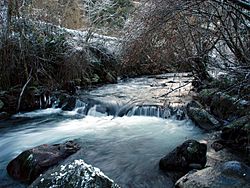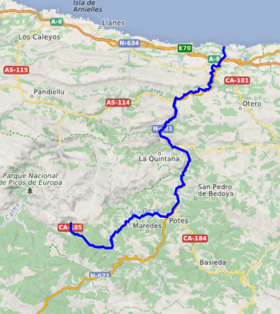Deva (river) facts for kids
Quick facts for kids Deva |
|
|---|---|

Deva River in Camaleño
|
|

Course of the Deva
|
|
| Country | Spain |
| State | Cantabria, Asturias |
| Physical characteristics | |
| Main source | Cirque Fuente Dé, Camaleño 1,100 m (3,600 ft) |
| River mouth | Tina Mayor Bay of Biscay 0 m (0 ft) |
| Length | 64 km (40 mi) |
| Basin features | |
| Basin size | 1,195 km2 (461 sq mi) |
| Tributaries |
|
The Deva is a beautiful river located in northern Spain. It flows through two special areas called Cantabria and Asturias. Finally, it reaches the sea at a place called Tina Mayor, which is like a wide river mouth or estuary. Some of its important smaller rivers that join it are the Cares and Urdón rivers.
The Deva River: A Journey Through Spain
The Deva River starts its journey high up in the mountains. Its source is at Fuente Dé, which is a cool, bowl-shaped valley called a Cirque. This spot is in the town of Camaleño. From there, the river flows downhill, collecting water as it goes.
The river travels for about 64 kilometers (around 40 miles). It passes through different landscapes in both Cantabria and Asturias. Eventually, the Deva River reaches the Bay of Biscay, which is part of the Atlantic Ocean.
What's in a Name?
The name "Deva" is very old and has an interesting meaning. It comes from Celtic mythology, where Deva was a goddess connected to water. This name is similar to other rivers named Dee in England.
Experts believe the name "Deva" might come from an even older language called Proto-Indo-European language. In that language, the word *deiueh2- meant 'a goddess'. So, the river's name means "goddess river," which is pretty cool!
River Facts and Figures
The Deva River is an important part of the local environment. It collects water from an area of about 1,195 square kilometers (461 square miles). This whole area is called its drainage basin.
Many smaller rivers flow into the Deva. On its left side, the Urdón and Cares rivers join it. On its right side, the Quiviesa and Bullón rivers add their waters. All these rivers together make the Deva flow strongly towards the sea.
See also
 In Spanish: Río Deva para niños
In Spanish: Río Deva para niños
 | Leon Lynch |
 | Milton P. Webster |
 | Ferdinand Smith |

